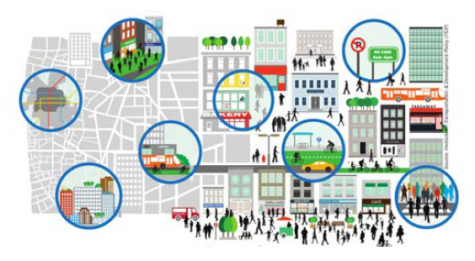
The majority of the population in the WHO/Europe and UNECE region lives in urban areas. Urbanization is expected to continue in the decades to come.
People living in urban areas are exposed to heavy congestion, vehicle emissions of noise and air pollutants, the risk of road traffic injuries and reduced opportunities to be physically active. This exposure has adverse impacts on the quality of urban life, health, the environment, efficiency and ultimately economy. In addition, social exclusion can be increased by unequal access to transportation and thus to access services, education, health care, jobs and amenities.
Member States, aware of the above, created a new goal in 2014 – Priority Goal 5 – to reflect the importance of integrating transport policies into urban and spatial planning ones. As a consequence, France and the Russian Federation took the initiative of starting a new Partnership on Priority Goal 5, which was established in 2015.
Objective and scope
The main aim of the Partnership is to:
- Raise awareness internationally of the importance of combining transport planning with land-use planning
- Promote international cooperation to support countries in developing more sustainable transport and health-oriented urban mobility policies.
The Partnership identified several ways to achieve its goals namely:
- Setting up scientific cooperation between research institutes and scientific centres on integrating policies on transport and urban planning
- Organizing training sessions on sustainable transport planning within the framework of THE PEP Academy
- Developing recommendations and guidance and exchanging experiences and best practices for city administrations and urban and transport planners
- Organizing international conferences and seminars for representatives of city administrations and transport authorities on issues related to transportation efficiency and safety
- Establishing a pool of international experts on transport and land-use planning.
Partners and target groups
The Partnership benefitted from the participation of the following member States:
- Ministry of Transport and the Scientific and Research Institute of Motor Transport of the Russian Federation (co-coordinator)
- Ministry for an Ecological and Inclusive Transition, Directorate General for Infrastructure, Transport and the Sea, of France (co-coordinator).
Resources
Handbook on Sustainable Urban Mobility and Spatial Planning.


